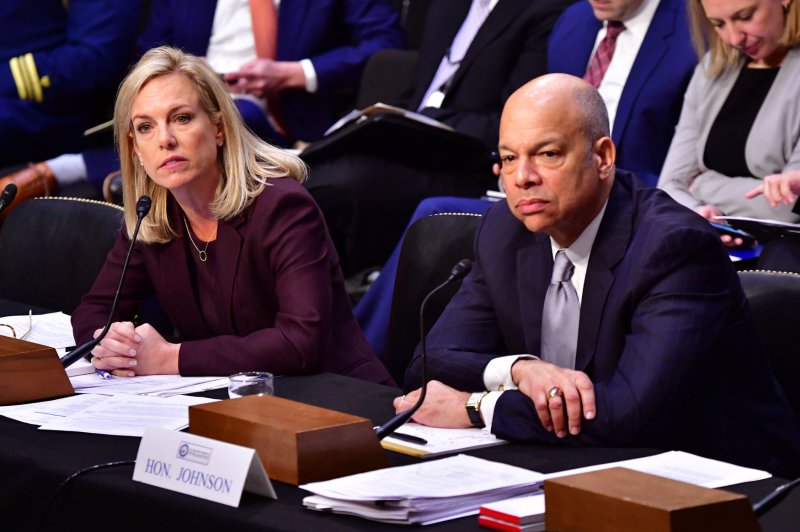1 of 3 | Homeland Security Secretary Kirstjen.Nielsen (L) and former Homeland Security Secretary Jeh Johnson testify during a Senate intelligence hearing on election security on Capitol Hill in Washington, D.C., on Wednesday. Photo by Kevin Dietsch/UPI |
License Photo
March 21 (UPI) -- Voting precincts within swing states are more vulnerable to cyberthreats and election meddling than others, current and former secretaries of the Department of Homeland Security told a Senate committee Wednesday.
DHS Secretary Kirstjen Nielsen and Jeh Johnson, the department's chief under President Barack Obama, told the Senate intelligence committee that because of decentralization of the country's voting system, smaller precincts may be subject to interference from bad actors with enough power to threaten entire nations.
"The reality is: Given our Electoral College and our current politics, national elections are decided in this country in a few precincts, in a few key swing states," Johnson said. "The outcome, therefore, may dance on the head of a pin."
Decentralization in the country's voting system "makes it difficult to have a nationwide effect but also makes it perhaps of greater threat at a local level," Nielsen said. "If it's a swing state or swing area, that can, in turn, have a national effect."
Johnson said the Obama administration warned the country about Russian interference in the presidential election in October 2016, but the warning was overlooked.
"Well, senator, the American people were told," Johnson said when Sen. Dianne Feinstein, D-Calif., asked him why the administration didn't alert Americans about the meddling.
Johnson said people and journalists paid more attention to the release of a recording in which then-Republican candidate Donald Trump can be heard talking about grabbing women without their consent.
"Frankly, it did not get the attention that I thought it should've received. It was below-the-fold news the next day, because of the release of the Access Hollywood video the same day, and a number of other events," he said. "I was expecting follow-up from a lot of journalists, and we never got that because everyone was focused on the campaign and that video, and that debate that Sunday."
The hearing came one day after the Senate intelligence committee, which is investigating Russia's alleged meddling in the presidential election, made recommendations for preparing for the 2018 midterms. The senators said state elections officials need more federal funding to defend against cyberthreats.
"The committee recommends Congress urgently pass legislation increasing assistance," the committee said.















